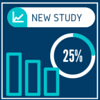 Abstract
Abstract
Despite the heterogeneous symptom presentation and complex etiology of major depressive disorder (MDD), functional neuroimaging studies have shown with remarkable consistency that dysfunction in mesocorticolimbic brain systems are central to the disorder. Relatively less research has focused on the identification of biological markers of response to antidepressant treatment that would serve to improve the personalized delivery of empirically supported antidepressant interventions. In the present study, we investigated whether resting-state functional brain connectivity (rs-fcMRI) predicted response to Behavioral Activation Treatment for Depression, an empirically validated psychotherapy modality designed to increase engagement with rewarding stimuli and reduce avoidance behaviors. Twenty-three unmedicated outpatients with MDD and 20 matched nondepressed controls completed rs-fcMRI scans after which the MDD group received an average of 12 sessions of psychotherapy. The mean change in Beck Depression Inventory-II scores after psychotherapy was 12.04 points, a clinically meaningful response. Resting-state neuroimaging data were analyzed with a seed-based approach to investigate functional connectivity with four canonical resting-state networks: the default mode network, the dorsal attention network, the executive control network, and the salience network. At baseline, the MDD group was characterized by relative hyperconnectivity of multiple regions with precuneus, anterior insula, dorsal anterior cingulate cortex (dACC), and left dorsolateral prefrontal cortex seeds and by relative hypoconnectivity with intraparietal sulcus, anterior insula, and dACC seeds. Additionally, connectivity of the precuneus with the left middle temporal gyrus and connectivity of the dACC with the parahippocampal gyrus predicted the magnitude of pretreatment MDD symptoms. Hierarchical linear modeling revealed that response to psychotherapy in the MDD group was predicted by pretreatment connectivity of the right insula with the right middle temporal gyrus and the left intraparietal sulcus with the orbital frontal cortex. These results add to the nascent body of literature investigating pretreatment rs-fcMRI predictors of antidepressant treatment response and is the first study to examine rs-fcMRI predictors of response to psychotherapy.
Crowther, A., Smoski, M.J., Minkel, J., Moore, T., Gibbs, D., Petty, C., Dichter, G.S. (2015). Resting-state connectivity predictors of response to psychotherapy in major depressive disorder. Neuropsychopharmacology, 40, 1659-1673. doi: 10.038/npp205.12